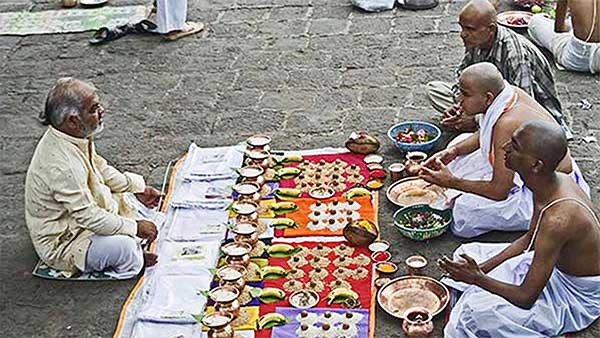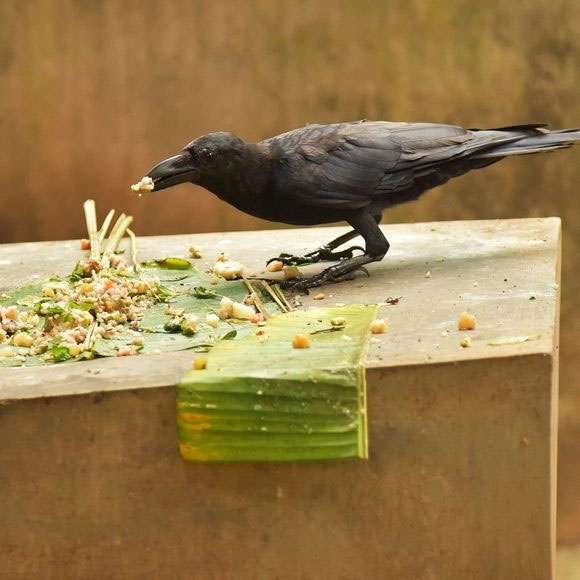Distorted Meaning & Corrupt Additions in Puranas
Prologue
Can the spirits of one’s ancestral fathers (pitrus) be summoned in the ritual of Shraadh? Who can be called an ancestral father? In fact, every one becomes ancestral, be it be son, father or grandfather. When a person dies, his ties with everyone in the family including the son is terminated. Spending a pre-determined life time, one settles all accounts with the relatives and others and then the body gets discarded. They are never to meet gain except for situations where some unfinished business relationship had got established. In such a scenario, they would take birth in situations where they would come together again. So, Shraadh offerings are of no meaning.
A ritual
One of the rituals that I have known from my childhood as observed in different parts of the country is the observation of Shraadhh for pitr or pitar (a ritualistic offering to deceased parents/relatives or funeral oblations) or in short a death anniversary offering. Such an act of shraaddh finds observance during a fortnight of so-called shraadhhpaksh or pitrpaksh before the nine nights of dancing celebration (Navratri). Before we look into it logically in-depth, let us understand what pitr exactly stands for and what is its true meaning.
Pitr or pitar means the protector. Pitar is a distorted version of pitr. Its meaning is one who has mature wisdom, one who is elderly, one who protects, one who gifts knowledge or educates, one who gives birth to, one who gives a daughter in marriage, one who looks after us or nurtures and nourishes us etc. A live Pitru/Pitar alone can protect others. Living parents only are capable of guiding their children. Rich with experience, they could part with their worldly knowledge for the benefit of children. Only living parents could protect their children fin every possible way. From all the meanings given above, it should be clear that all of them are related to living people and not to dead ones. Dead people cannot do such deeds.
Why can’t a dead one be called pitr?
Once dead, pitr or pitar ceases to be pitr or pitar because it is neither a soul nor a body. It is only when the soul gets integrated with the body that this merged entity becomes eligible to be called pitr or pitar. Can there be a pitr/pitar once this soul-body union gets broken? Where is the pitr/pitar? Now, if the Jeev (soul) be considered a pitr, the contention of the deathlessness of the soul becomes questionable as people consider dead ones as pitr/pitar. In that case, the issue of souls being senior to one another will need to be relooked. There cannot be a senior or junior soul as all souls become dead. Again, we may have to visualize a situation where one soul is born after another. If this situation is not agreeable then, clearly no relation exists between soul and pitr/pitar. And in that case, to whom would shraaddh be offered? I am sure everybody would agree that the soul is deathless. In that case, there is no question of an age difference and one being older or the other being younger.
If the soul is overruled then, what is left is the body. Now, this also cannot be called pitr/pitar as the body without a soul is nothing but a corpse. If the body is taken as pitr/pitar then, will not the one who cremates the body be committing a sin? Will the cremation of the body be considered a good deed when one is burning or cremating a pitr/pitar? However, people think it as a good act or an act of nobility to dispose off the body through cremation or burial.
It is to be understood that the physical bond that exists among human beings is relevant to or confined to this material world only. Once dead, the individual is nobody, and all the bonds or relations cease to exist. Every human being is born to enjoy or suffer the fruits of previous karmic actions. From the time of birth, mutual relationships come into play. If the connections such as mother, father, sister, brother etc. are considered to remain intact forever (i.e. even after their expiry) possibility of marriages between those who were a son, mother, sister, brother in their earlier births becomes a possibility. Such a case is unthinkable for the reason the soul has nothing to do with the relationships like mother, father etc. Relationships happen only when the soul enters the body. Therefore, Shraadhh could be of only those who are alive and not of dead ones.
Original meaning and distortion
At the beginning itself, it was made clear that all acts associated with pitr could be done only for living individuals and not for dead ones. Shraadhh in Hindi means any action done with shraddha (faith and dedication). So, the ultimate meaning is that we should serve our living elderly with full devotion and commitment. Yes, we must perform Shraadh. We must serve our parents, grandparents, teachers, and scholars, faithfully and well when alive. Such act of serving the living alone constitutes real Shraaddh (offering).
But then, the meaning and actions associated with it have been intentionally distorted, and a very different sense introduced probably because of vested interests. Such distorted versions started from the time of Puranas. So, let us see some of those misplaced writings.
Corrupt contents in Purans

Gautama Nyaya Sutras (chapter 15, point 15): “The manes (pitras) are satisfied for a month by gifts of sesamum, Mâsha-beans, rice, barley, and water. For (three) years by fish and the flesh of common deer, spotted deer, hares, turtles, boars, and sheep. For twelve years by cow’s milk and messes made of milk. For a very long time by the flesh of (the crane called) Vârdhrînasa, by Ocimum sanctum (sacred Basil), and by the flesh of goats, (specifically) of a red (he-goat), and of a rhinoceros, (if these dishes are) mixed with honey.
Now, let us take a look at what finds mentioned in Vishnu Puran Section 3, chapter 16. The Manes are satisfied for a month by gifts of oblationary offerings; For two months by fish; for three months by the flesh of rabbit; for four months by the flesh of mongoose; for five months by the flesh of a pig; for six months by the flesh of goat; for seven months by the flesh of musk deer; for eight months by the flesh of common /spotted deer; for nine months by the flesh of a blue bull; for ten months by the flesh of buffalo; for eleven months by the flesh of cow and, for all time by the flesh of a specific bird, spotted deer, hares, turtles, boars, and sheep. For twelve years by cow’s milk and messes made of milk. For a very long time by the flesh of (the crane called) Vârdhrînasa, by Ocynurn sanctum (sacred Basil), and by the flesh of goats (specifically) of a red (he-goat), and a rhinoceros (if these dishes are) mixed with honey. There are many such writings in other Purans as well. Are these contentions really meaningful or justifiably acceptable? Doubtlessly, these are human interventions or distortions of commission.
Irony of illogicality
So, seen logically, this ritualistic observance of Shraadh is highly hypocritical and superstitious which has fooled people and, ironically even educated people have fallen prey to this act which has no meaning involving waste of time and money. It is time that people understood the importance of shraaddh in the right perspective that service is to be done for people living and not for the dead. Of course, it is left to the intellect of people to decide what is right and what is wrong.
The Hindu community believes in rebirth. During rebirth, a soul, from one body enters into another body within a period (variable, depending on the factors determining rebirth). On the other side, we say that the soul is wandering in the pitr lok thirsting for water and hungry for food and so we keep them feeding every year.
If we believe in rebirth then, where is the question of the soul wandering in the pitr lok? It takes birth either in a human form or in an animal form according to its past karmas. If we believe that the soul reachesthe pitr lok, then, the concept of rebirth stands falsified. It is an irony that rituals are performed or, are directed to be performed in the name of improving the status of next birth and again after death, their children are made to perform rituals in the name of the departed soul saying that it is wandering in the pitr lok.





